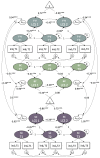Coping with the COVID-19 Pandemic: Perceived Changes in Psychological Vulnerability, Resilience and Social Cohesion before, during and after Lockdown
- PMID: 35328981
- PMCID: PMC8952288
- DOI: 10.3390/ijerph19063290
Coping with the COVID-19 Pandemic: Perceived Changes in Psychological Vulnerability, Resilience and Social Cohesion before, during and after Lockdown
Abstract
The COVID-19 pandemic and associated lockdowns have posed unique and severe challenges to our global society. To gain an integrative understanding of pervasive social and mental health impacts in 3522 Berlin residents aged 18 to 65, we systematically investigated the structural and temporal relationship between a variety of psychological indicators of vulnerability, resilience and social cohesion before, during and after the first lockdown in Germany using a retrospective longitudinal study design. Factor analyses revealed that (a) vulnerability and resilience indicators converged on one general bipolar factor, (b) residual variance of resilience indicators formed a distinct factor of adaptive coping capacities and (c) social cohesion could be reliably measured with a hierarchical model including four first-order dimensions of trust, a sense of belonging, social interactions and social engagement, and one second-order social cohesion factor. In the second step, latent change score models revealed that overall psychological vulnerability increased during the first lockdown and decreased again during re-opening, although not to baseline levels. Levels of social cohesion, in contrast, first decreased and then increased again during re-opening. Furthermore, participants who increased in vulnerability simultaneously decreased in social cohesion and adaptive coping during lockdown. While higher pre-lockdown levels of social cohesion predicted a stronger lockdown effect on mental health, individuals with higher social cohesion during the lockdown and positive change in coping abilities and social cohesion during re-opening showed better mental health recovery, highlighting the important role of social capacities in both amplifying but also overcoming the multiple challenges of this collective crisis.
Keywords: COVID-19 pandemic; adaptive coping; mental health; resilience; social cohesion; vulnerability.
Conflict of interest statement
The authors declare no conflict of interest.
Figures






Similar articles
-
Impact of childhood maltreatment on adult mental health trajectories during the COVID-19 pandemic.Brain Behav Immun. 2025 Mar;125:444-451. doi: 10.1016/j.bbi.2025.02.022. Epub 2025 Feb 21. Brain Behav Immun. 2025. PMID: 39988006
-
Secondary traumatic stress and vicarious posttraumatic growth in healthcare workers during the first COVID-19 lockdown in Greece: The role of resilience and coping strategies.Psychiatriki. 2021 Apr 19;32(1):19-25. doi: 10.22365/jpsych.2021.001. Epub 2021 Mar 8. Psychiatriki. 2021. PMID: 33759805
-
Exploring the Structure and Interrelations of Time-Stable Psychological Resilience, Psychological Vulnerability, and Social Cohesion.Front Psychiatry. 2022 Mar 11;13:804763. doi: 10.3389/fpsyt.2022.804763. eCollection 2022. Front Psychiatry. 2022. PMID: 35360131 Free PMC article.
-
[The COVID-19 pandemic in Germany: mental health trajectories, resilient and vulnerable groups].Nervenarzt. 2025 May;96(3):266-271. doi: 10.1007/s00115-025-01824-8. Epub 2025 Apr 3. Nervenarzt. 2025. PMID: 40180657 Free PMC article. Review. German.
-
The Wither or Thrive Model of Resilience: an Integrative Framework of Dynamic Vulnerability and Resilience in the Face of Repeated Stressors During the COVID-19 Pandemic.Advers Resil Sci. 2022;3(4):261-282. doi: 10.1007/s42844-022-00069-7. Epub 2022 Jul 13. Advers Resil Sci. 2022. PMID: 35856054 Free PMC article. Review.
Cited by
-
Is society caught up in a Death Spiral? Modeling societal demise and its reversal.Front Sociol. 2024 Mar 12;9:1194597. doi: 10.3389/fsoc.2024.1194597. eCollection 2024. Front Sociol. 2024. PMID: 38533441 Free PMC article. Review.
-
Mental Health in the Post-Lockdown Scenario: A Scientometric Investigation of the Main Thematic Trends of Research.Int J Environ Res Public Health. 2023 Jul 6;20(13):6310. doi: 10.3390/ijerph20136310. Int J Environ Res Public Health. 2023. PMID: 37444157 Free PMC article. Review.
-
Heterogeneous Mental Health Responses to the COVID-19 Pandemic in Germany: An Examination of Long-Term Trajectories, Risk Factors, and Vulnerable Groups.Healthcare (Basel). 2023 May 3;11(9):1305. doi: 10.3390/healthcare11091305. Healthcare (Basel). 2023. PMID: 37174848 Free PMC article.
-
A neuroscience perspective on the plasticity of the social and relational brain.Ann N Y Acad Sci. 2025 May;1547(1):52-74. doi: 10.1111/nyas.15319. Epub 2025 Apr 3. Ann N Y Acad Sci. 2025. PMID: 40178439 Free PMC article. Review.
-
Characteristics of Collective Resilience and Its Influencing Factors from the Perspective of Psychological Emotion: A Case Study of COVID-19 in China.Int J Environ Res Public Health. 2022 Nov 14;19(22):14958. doi: 10.3390/ijerph192214958. Int J Environ Res Public Health. 2022. PMID: 36429706 Free PMC article.
References
-
- O’Connor R.C., Wetherall K., Cleare S., McClelland H., Melson A.J., Niedzwiedz C.L., O’Carroll R.E., O’Connor D.B., Platt S., Scowcroft E., et al. Mental health and well-being during the COVID-19 pandemic: Longitudinal analyses of adults in the UK COVID-19 Mental Health & Wellbeing study. Br. J. Psychiatry. 2021;218:326–333. - PMC - PubMed
Publication types
MeSH terms
Grants and funding
LinkOut - more resources
Full Text Sources
Medical

